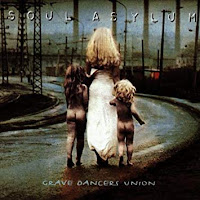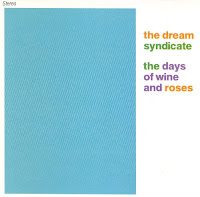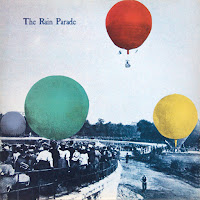I am a massive football fan. That’s football aka soccer, not
football played with an oval ball. That said I have been known to be a couch
potato for any World Cup regardless of ball shape. Actually let’s face it, I’m
a massive sports fan full stop. If I hit on sports when I’m channel surfing
I’ll stop and look regardless of what it is. But football’s what I grew up with
so it’s always going to be number one.
My approach to music is similar to my approach to sport. If
it doesn’t give you a thrill and make you sweat it isn’t worth it. But the
similarity doesn’t end there. In football you have absurdly overblown clubs
with all the money in the world sucking up the resources of its supporters and
giving them sometimes soulless teams that are only in it for the money in
return. In music you have overblown record companies sucking up the resources
of fans to provide a soulless mainstream product of no real value, for their
‘entertainment’. The difference is that music fans put up with it whereas
football fans will boo a boring team off the field. That doesn’t change the
fact that at the highest level in football you can get teams that are so full
of talent that they cancel each other out. End result, technically proficient
games with no real highlights. Go to a big money, energy drink sponsored gig
and what do you get? Hmmm.
In football some of the best competition exists at the
second tier. The fight for promotion to the top divisions produces some of the
edgiest, most committed games you will ever see, with some of the wildest fans
along for the ride. It comes down to commitment and a passion to prove yourself
worthy of the big time. When it comes down to it, the only real difference
between the first and second division is the money to put on the gloss and pull
the big name sponsors.
The highest tier of music is generally defined by major
record companies with the money to force their turgid mainstream product onto
as many people as can stand it (or who simply don’t know about anything else
because it isn’t pushed). Occasionally you get someone who gains promotion to
the big time, but watch how quickly they change and start to sound like
everyone else, or crash and burn from the pressure to sell out. The first
division of music is a factory cataloguing a few acceptable designs using
pre-determined and proven components following the time honoured “if it worked
yesterday it will work tomorrow” method of production. Start beat A, add synth
line B, get pretty performers (vocal talent optional), teach them dance move C
for use in glossy soft porn video style D. If possible try and generate some
kind of crappy controversy around them to get social media going and Bob’s your
uncle. Job done. Let’s do it all again tomorrow with the next celebrity sucking
sap waiting in line.
None of this is new of course. It’s how showbiz has always
worked. Taking risks is bad practice. It could affect the bottom line. Risks
are left to people with less to lose. But that’s where things start to get a
bit more interesting. This post was inspired by me coming across a CD by
Concrete Blonde for $2 in a charity shop. It came out in 1987, at a time when
the music biz had a serious strangle hold on what people had access to, similar
to the way the biz is now but without the streaming options. There was a
massive gap between the first and second division in what could be achieved
commercially in other words. At that time independent labels were struggling
against MTV and the absurd money being thrown into pushing crap at the highest
levels. Think hair metal. Think synthesizers with everything. Think primitive
digital studios producing the same robotic drum sound on every hit record. Indies
had to come up with the goods to survive, and they did. The second division was
where the only real action could be found in that hideous cultural wasteland.
My Concrete Blonde CD is a time capsule. It’s an awesome
slab of pure rock made at a time when pure rock was not included on any major
label’s sales sheet. This was their first album and they made a few more great
records without making it ‘big’. Johnette Napolitano had one of the best female
rock voices in history and should have been massive but was just too real for
the majors to accept. Which is a tragically familiar story no matter what the
date is.
So who else was playing hard in the second division in our
late 80’s time capsule?
Most of the action was in the USA. In fact most of the
action was focussed on Minneapolis and LA. In Minneapolis, Husker Du made it to
major label status (Warner Bros) and then promptly imploded after a couple of
okay albums that filed off their hardcore edges and left the songs as the
focus. Probably one of the least likely acts to ever perform such a trick, but
the band were nice guys and that probably made it more likely than someone like
The Replacements from across town. Led by an eminently nice guy in Paul
Westerberg, booze and other substances were The Replacements undoing, and they
got to the play offs for the first division before scoring an own
goal by getting drunk on Saturday Night Live and saying a rude word to the
audience. Neither act was likely to endear them to the chairman of the board,
and they eventually faded away after some thrilling, emotionally rich and
powerful albums. Pleased To Meet Me and Tim are the ones that brought them
close to the big time, but Let It Be also includes bits of their earlier hardcore
roots and is probably the pick of the bunch. Here Comes a Regular and Little
Mascara off Tim pack a real emotional punch and I admit to getting a little
choked up by them at times. Definitely not music for the good times but it will
surely help you get through the bad. The Replacements are another one of my
favourite bands.
Also from Minneapolis were Soul Asylum. They had more
commercial appeal and released albums on A&M and Columbia, eventually
selling enough to get a platinum album off the back of Nirvana’s success, but
they only released a couple of worthy products and after grunge became passé to
record companies they quickly faded back to their roots. Pre-Megaupload’s
massive fail, I managed to find a set of demos for their A&M album Hang
Time on a blog somewhere. They have a more rock n roll edge than the commercial
product and are recommended if you can track them down.
From LA, well Hicksville California actually, The Dream
Syndicate provided a Velvet Underground inspired wall of noise that had
strangely appealing pop hooks. Leader Steve Wynn had a voice that wasn’t about
to challenge Seal in the chanteuse stakes, but he and the band did a convincing
job of merging artiness and rock n roll without sounding pretentious. Debut
album, The Days of Wine and Roses was easily their best and they were more
influential than commercial, dogged by line-up changes that killed any
momentum. Kurt Cobain’s vocals owe a big debt to Steve. So do mine for that
matter.
Definitely from LA, The Rain Parade were lumped in with the
Dream Syndicate as part of the Paisley Underground – a marketing term from the early
80s for rock acts that had a 60’s psych influence. The Rain Parade produced a
fairly gentle take on things in comparison to The Dream Syndicate but held
their own along with bands like Green on Red and jangly girl group The Bangles.
What I like most about The Rain Parade are their album titles and covers more
than the sounds within. Emergency Third Rail Power Trip and Explosions in the
Glass Palace are nice listens, but without a commercial point of reference they
were ultimately destined for obscurity.
Completing the LA legacy are the hardest case band on the
page. The Gun Club would have been huge on any planet that worships deep
rooted, blues based, hell raising rock n roll, but sadly Planet Earth is not
one of them. Leader Jeffrey Lee Pierce raged more than Nirvana against ugly
bullshit, wrote better songs than any MTV hogging mega act and had the balls to
call The Cramps tame. What prevented them from reaching promotion to the big
time were two things: Jeffrey Lee had alcohol issues even AA would struggle
with, and their live act was scarily aggressive at best and dangerously deranged
at worst. That is not a winning combination for major label A&R men on the
lookout for the next Huey Lewis. Somehow they kept going for a decade or more
before Jeffrey Lee reached the end of the road and became another ghost on the
highway. Any of their albums are worth checking out, if you can excuse some of
their more excessive peaks.
I’ll leave the last word on this post to Jeffrey Lee as a
challenge to all mainstream power brokers: “it is not an art statement to drown
a few passionate men”.
For music without division check out:







No comments:
Post a Comment